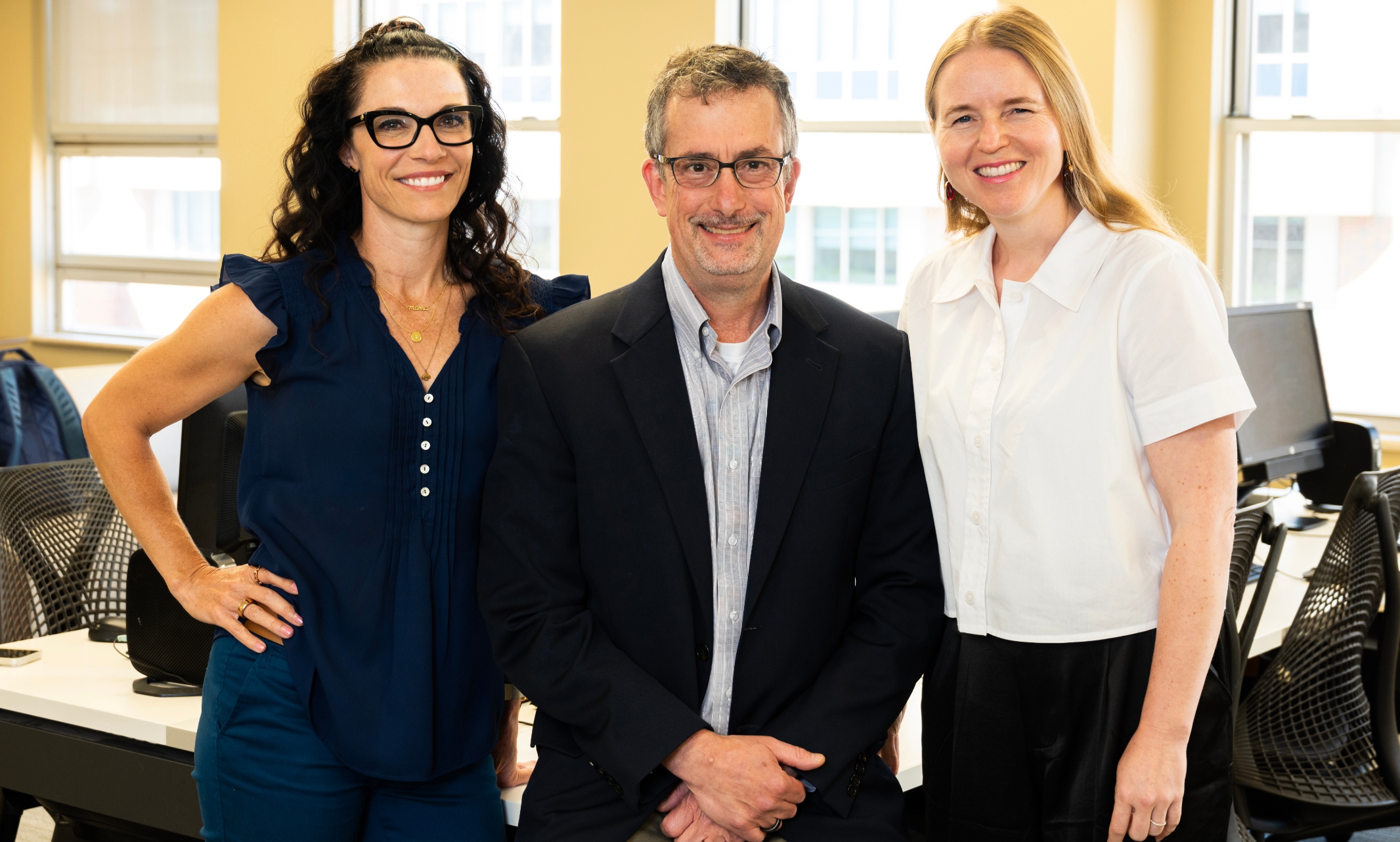
$8.3 million grant is largest NIH award in university history
The University of Missouri-Kansas City Healthcare Institute for Innovations in Quality and Saint Luke’s Mid America Heart Institute today announced a nationwide four-year study of U.S. pregnant women with heart disease to better understand and combat maternal deaths and illnesses. The National Institutes of Health awarded $8.3 million to UMKC HI-IQ, the largest NIH grant the university has received so far.
The U.S. has the highest maternal mortality rate of any industrialized nation, and the only country whose rate is increasing, and cardiovascular disease is the leading cause of maternal death. While only 2% to 4% of pregnancies are in people with pre-existing cardiovascular disease, they account for more than a third of maternal deaths. These adverse events disproportionately impact Black, Hispanic, American Indian/Alaskan Native and Asian/Pacific Islander pregnancies.
The National Heart, Lung and Blood Institute awarded UMKC HI-IQ funding for the study, Heart Outcomes in Pregnancy Expectations (HOPE) for Mom and Baby, which will enroll 1,000 pregnant women with cardiovascular disease from 36 confirmed enrolling sites nationwide, to study their care and outcomes.
HOPE will be the first U.S. study to describe the care and outcomes of pregnant individuals with heart disease to better understand the patient characteristics, treatment and organization of healthcare delivery that most influence these outcomes so that standardized-care protocols can be developed and disseminated to combat the United States’ tragically high rate of heart-related deaths and illnesses.
HOPE was initiated as a two-site pilot by Saint Luke’s Hospital of Kansas City in 2019 at Saint Luke’s Hospital and Massachusetts General Hospital in Boston.
Philanthropic gifts from the Muriel McBrien Kauffman Family Foundation, the Victor E. Speas Foundation, Bank of America, N.A., Trustee and Saint Luke's Hospital Auxiliary provided the runway for the institute’s nationwide HOPE study, said Anna Grodzinsky (B.L.A. '08/M.D. '09, M.S. '15.), cardiologist at Saint Luke’s Mid America Heart Institute and associate professor of medicine at UMKC.
“Heart disease is responsible for more than a third of all pregnancy-related deaths in the U.S., yet we lack research that has followed this patient population,” Grodzinsky said. “The HOPE study will help us gain a better understanding of how we as providers can better care for these patients in a more standardized way in an effort to lower the risk of adverse outcomes.”
Grodzinsky was a co-principal investigator in the pilot phase along with Karen Florio, D.O., M.P.H., a maternal-fetal medicine specialist at both UMKC and the University of Missouri, now a co-principal investigator on the expanded study. Both will co-lead HOPE with principal investigator John Spertus, M.D., M.P.H., UMKC HI-IQ founder and director, clinical director of outcomes research at Saint Luke’s Mid America Heart Institute, a UMKC professor of medicine and the Daniel J. Lauer/Missouri Endowed Chair in Metabolic and Vascular Disease Research.
“The HOPE study will generate important new insights into the care of pregnant people with cardiovascular disease,” Spertus said. “We anticipate generating two key contributions: patient-level prediction models of adverse clinical outcomes and defining the structures of cardio-obstetrics care that are independently associated with better outcomes. Both lay the foundation for improving care for these high-risk patients.”
“Guided by patients with lived experience and committed experts, the HOPE study will support improvements in patient-level care by developing risk models that can be used to support evidence-based protocols while also guiding the enrolling centers on how best to organize cardio-obstetrics care to optimize outcomes and minimize disparities,” Florio said. “The study will further our understanding of the nuanced care needed for pregnant people with heart disease.”
About the University of Missouri-Kansas City Healthcare Institute for Innovations in Quality Since 2017, the team of UMKC Healthcare Institute for Innovations in Quality, or UMKC HI-IQ, has worked with a network of providers, payers, patients and nonprofit organizations to identify strategies to improve the value (better care at lower cost) and equity of healthcare in Kansas City. For more information about the institute, visit healthcareinstitute.umkc.edu.
About Saint Luke’s Mid America Heart Institute Saint Luke’s Mid America Heart Institute is part of Saint Luke’s Health System, which serves the West Region of BJC Health System, one of the largest nonprofit health care organizations in the United States. The Heart Institute, a teaching affiliate of the University of Missouri-Kansas City School of Medicine, is one of the most distinguished cardiovascular programs in the country. Its legacy of innovation began more than 40 years ago when it opened as the nation’s first freestanding heart hospital. Since then, the nearly 200 board-certified specialists and cardiovascular experts have earned a global reputation for excellence in the treatment of heart disease, including interventional cardiology, cardiovascular surgery, imaging, heart failure, transplant, heart disease prevention, cardio-oncology, cardiometabolic disease, women’s heart disease, electrophysiology, outcomes research, and health economics by being the third hospital in the U.S. to achieve Comprehensive Cardiac Center certification from The Joint Commission.
In 2023, the Heart Institute completed its 1,000th heart transplant, making it one of only 23 advanced programs to have reached this milestone.
About the University of Missouri-Kansas City The University of Missouri-Kansas City, one of four University of Missouri campuses, is a public research university serving more than 15,500 undergraduate, graduate and professional students. UMKC engages with the community and world based on its mission: placing student success at the center; leading in life and health sciences; advancing regional engagement; excelling in visual and performing arts; and promoting research and economic development. For more information about UMKC, visit umkc.edu.
Sep 30, 2024
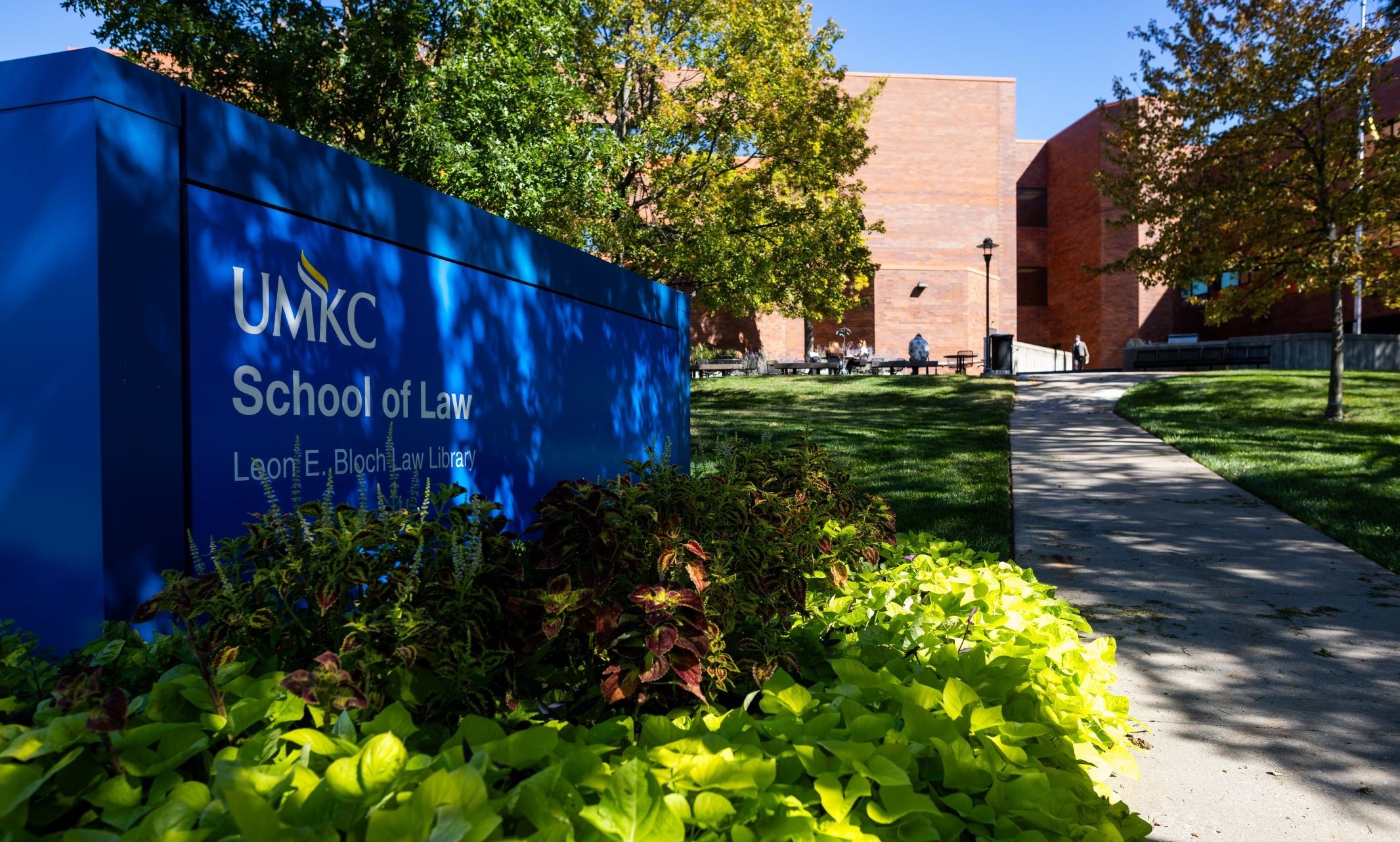
School’s initiative yields 90% pass rate
The pass rate of UMKC School of Law students who took the Missouri bar exam for the first time in July 2024 was 90.6%, more than 5% higher than the pass rate of all Missouri first-time test takers. UMKC Law students had the highest pass rate of all public universities in Missouri and Kansas.
“We are incredibly proud of our success on this bar exam,” UMKC School of Law Dean Lumen Mulligan said. “It is a team effort: hardworking students, great faculty, the nation’s top bar-passage professor in Wanda Temm and alumni support. Each teammate is essential. Indeed, we appreciate all the alumni gifts supporting the bar prep program, especially our gold-level sponsorship from Wagstaff & Cartmell, LLP.”
Students who took the July bar exam are some of the first to benefit from the new bar preparation program, an initiative by the UMKC School of Law to provide every juris doctorate student with a commercial bar prep program and in-person supplemental course at no extra cost. With a July 2024 pass rate that is 9% higher than the July 2023 pass rate of UMKC Law students, the program’s impact is outstanding.
Wanda Temm, J.D., a nationally recognized expert on bar passage, has taught the supplemental course for more than 20 years. Temm has taught nearly 2,000 students how to prepare for the bar exam. When she began the course, UMKC School of Law was one of the first in the country to offer a supplemental bar preparation course.
“UMKC has a proud tradition of supporting our students throughout their legal education and bar preparation,” Temm said. “Credit goes to our students who put in the effort it takes and to the law school community, from the administration to faculty, staff and alumni who volunteer to help year after year. We are so proud of this team effort and results.”
UMKC School of Law is one of few in the country to provide both a commercial bar preparation program and a supplemental in-person course at no cost to students beyond tuition and fees.
“This has been a game-changer for our students,” Mulligan said. “Law school is probably the most challenging intellectual exercise they’ll engage in, and the bar exam is the top of that mountain. This initiative ensures that every student has access to these important resources and the best chance to be successful.”
Reputable commercial bar preparation programs cost an average of $4,000, a high expense to ask students to pay before many of them have full-time jobs and one that cannot be paid for with a student loan. This leaves many students to make the difficult choice to take out a commercial loan to pay for a program or try to pass the bar exam without using a program to prepare.
Alexis Denny (J.D. ‘23) was in the first class of students to prepare for the bar exam with this extra support.
“The reality of bar prep is that some people have to make an economic-driven decision,” Denny said. “So they choose the cheapest or free option, don’t enroll in the in-person class and try to go it alone. With this initiative, no student has to choose between paying for bills or a bar prep program.”
Some large law firms pay for bar prep expenses, but students with ambitions in areas of law that don’t pay for bar prep, and likely don’t start at high salaries, are now able to pursue those ambitions with less concern regarding expense. UMKC School of Law prides itself on its ties and service to the Kansas City community, and this is one more way it provides value to that community, as well as its students.
“This initiative is deeply in line with our mission,” Mulligan said. “First-generation and other students with fewer economic means now have access to that resource to succeed. We’re helping to create lawyers who seek a career outside of the private sector such as in public defense, district attorney offices and public service work.”
Learn more about the bar preparation program and how to support UMKC Law students.
Sep 30, 2024
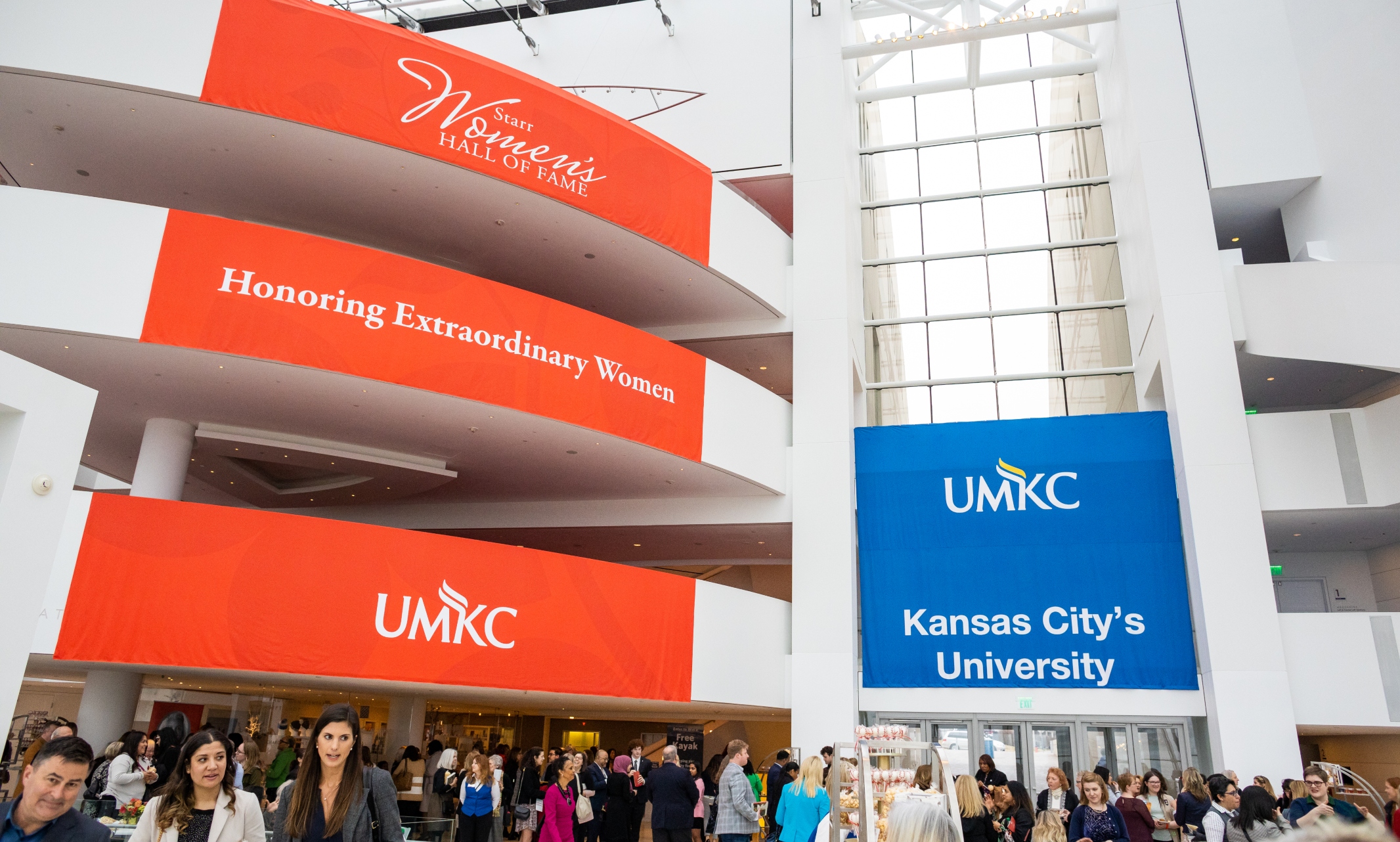
Honoring Kansas City influential female leaders who are first in their fields
The newest class of inductees to the University of Missouri-Kansas City Starr Women’s Hall of Fame, established a decade ago to recognize the extraordinary accomplishments of women who have benefitted the Kansas City region and beyond, showcases a major multitude of firsts.
The seven inductees include: the first Native American to argue a case in the Supreme Court; the first woman named as president of the Black Coaches Association and the first African American woman to coach the Olympic women’s basketball team; a philanthropist who helped shape the arts and healthcare delivery in Kansas City and who established the first center dedicated to women’s heart health in the U.S.; the woman who founded the first bilingual newspaper in the four-state region; a communications firm founder who has led the first family of multiple U.S. presidential administrations on diplomatic tours in dozens of countries; the first African American superintendent of the Hickman Mills Schools District who mentors women seeking doctoral degrees; and the first at-large chair of the Board of County Commissioners in Johnson County.
Starr Women’s Hall of Fame will induct its sixth class honoring trailblazing Kansas City women at 4 p.m. Feb. 20 at the Kauffman Center for the Performing Arts. Sponsor opportunities are available and individual ticket information will be available in the upcoming months.
From left to right, top to bottom: Eliza Conley Jr., Muriel Irene McBrien Kauffman, Roshann Parris, Clara Reyes, Annabeth Surbaugh, Marian E. Washington, Marjorie A. Williams
Learn more about the seven exceptional women who are the Class of 2025 inductees:
Eliza Burton Conley Jr.
Conley, who died in 1946, is the first Native American to argue a case before the Supreme Court and the first woman admitted to the Kansas Bar Association. She is best known for her advocacy to prevent the Wyandotte ancestral burial grounds in downtown Kansas City, Kansas being sold for commercial development space and her lifelong work to protect tribal rights. An alumna of the Kansas City School of Law, now UMKC School of Law, her legal and civic advocacy resulted in the placement of the Wyandotte National Burial Grounds on the National Register of Historic Places. She brought this battle to protect a sacred and culturally significant burial ground all the way to the Supreme Court and she, her sister and other women of the tribe erected a barricade on the cemetery and guarded it with shotguns.
Muriel Irene McBrien Kauffman
Through her leadership and investments in this community and those of the foundation that bears her name, Kauffman, has forever changed the arts and healthcare delivery landscape of the Kansas City community. Known as Mrs. K, she established a small business when she was only 16, and after her father died at age 50, she took over his businesses, including an insurance company, real estate holdings and a law practice. In the early 1960s, she married Ewing Kauffman who had a thriving business in Kansas City, Marion Laboratories. Muriel Kauffman became vice president-director of Marion Laboratories, and also served as the treasurer for 20 years before becoming president of the Muriel McBrien Kauffman Family Foundation that focused on her passion for the performing and visual arts. She also championed healthcare. The Saint Luke’s Muriel I. Kauffman’s Women’s Heart Center was the first center of its kind in the United States that is dedicated to proactive treatment of women’s heart health when it opened in 1994 in Kansas City. Kauffman also was the first woman elected to a major Kansas City bank board and the first woman to step onto the floor the New York Stock Exchange. Prior to Kauffman’s passing in 1995, her last wish expressed to her daughter, Julia, was to build a performing arts center. Julia took this request to heart and opened the 316,000-square-foot Kauffman Center for the Performing Arts in 2011. This center is not only home to three resident arts organizations: the Kansas City Symphony, the Kansas City Ballet and the Kansas City Lyric Opera, but also provides diverse performances and support for smaller arts organizations and programs creating unique accessibility for all. It is due to her that the area has the Kansas City Royals, convincing her husband they should purchase the team in 1968; and she became the first woman to receive a “Mr. Baseball” award from the Baseball Writers Association.
Roshann Parris
Parris began her career in Washington, D.C. in 1978 as a researcher on U.S. Middle East policy for the American Israel Public Affairs Committee, while traveling nationwide as national chairperson of the New York-based United Jewish Appeal Student Advisory Board. In 1988, she founded Parris Communications, a Kansas City-based public relations and strategic communications firm specializing in strategic corporate communications, media relations, public affairs and crisis communications with clients including Fortune 50 companies nationwide. Throughout her career, Parris has led advance teams on behalf of the White House during multiple presidential administrations, traveling to 60 countries. She considers her pro-bono White House work her national duty to the U.S. Just a few examples: Parris served as Lead Advance on the White House Presidential Advance Team accompanying President Clinton and the First Lady to more than 50 countries including historic visits to peacekeeping troops in Bosnia; to Greece for the Olympic Torch Lighting; to London for Princess Diana’s funeral; to Calcutta, India for the funeral of Mother Teresa and to Belfast, Jerusalem and Gaza in support of diplomatic peace efforts. Parris also has led a similar scope of work for both the Obama and Biden administrations.
Clara Reyes
Reyes, who died in February, came to the U.S. from Mexico with a dentistry degree that wasn't recognized. Instead of giving up, she pivoted and used her tenacity and determination to work in real estate and interpreting before founding the Dos Mundos (two worlds) newspaper in 1981, the first bilingual newspaper in the four-state region, with stories written in Spanish and English. She led by example, giving Hispanic people a voice whether by featuring them in the bilingual newspaper, providing jobs or through mentorship. She served in the Hispanic Chamber of Commerce of Greater Kansas City, the National Federation of Hispanic-Owned Publications and other organizations. She was integral in beautifying Southwest Boulevard in the ’80s and ’90s, working with city leaders to improve parking and pavers. Reyes, who had cancer and because of her advocacy for early detection, was president of the Hispanic Women Against Cancer, a support system for Latinas diagnosed with cancer. Reyes Media Group expanded into radio in 2006, starting three Spanish stations KYYS 1250 AM “La X,” KDTD 1340 AM “La Grande” and KYZZ 1480 AM “Dos Mundos Radio.” Her legacy lives on as the media group continues to thrive and is led by her children, Diana Reyes Raymer and Ed Reyes.
Annabeth Surbaugh
Surbaugh, who learned of her of her induction into the Hall before she died in August, was a pioneering leader in Johnson County, helping shape it into a prominent part of the metro area. A member of the Board of County Commissioners for 18 years, she was the first publicly elected, at-large chair of the board after passage of the county’s home rule charter. She served two terms (2003-2011) as chairman after 10 years (1993-2003) as Third District commissioner. As chair, the hallmarks of her service included restorative justice, environmental sustainability, affordable housing and mental health as well as long-term land planning in the rural areas of the county, not previously addressed. She focused on the greater Kansas City area, championing the bi-state tax for Union Station as well as the Mid-America Regional Council known as MARC. Prior public service included being elected as the first woman to serve on the board of Rural Water District No. 2 in 1988. In 1989, she was elected to the board of Water One of Johnson County, becoming the first woman chair in 1991.
Marian E. Washington
Coach Washington not only pioneered the women’s athletic program at the University of Kansas where she served as athletic director and women’s basketball coach, she also paved the way for Black women in sports in the U.S. She was the first of two Black women to play on a U.S. national team (1969-71); the first to serve as the head coach for a U.S. international team (1982 U.S. Select) and the first to coach on an Olympic women’s basketball staff (assistant on 1996 gold-medal-winning U.S. team). She was the first woman elected president of the Black Coaches Association and the first person to serve consecutive terms. She excelled in seven sports while in high school and was a two-time AAU All-American at West Chester State. She helped lead the Golden Rams to a national title in 1969 the first-ever in the history of collegiate women’s basketball and was also an outstanding track and field athlete and handball player. She was the face of women’s basketball at KU for more than 30 years, leading the Jayhawks to the NCAA Tournament 11 times and the AIAW Tournament (pre-NCAA) another four times. During her time at KU, she recruited and facilitated scholarships for students across the region, and was known to work tirelessly for opportunities and equity for women in all endeavors. Washington’s teams excelled with a high win rate, and she was widely recognized as an example of women’s success. Many players in the Women’s Basketball Hall of Fame, where she was inducted in 2004, attribute their success and leadership style to Coach Washington.
Marjorie A. Williams
Known widely as Dr. Marj, Williams has given nearly 40 years in service of schools, children, university scholars and teachers. Williams in 2000 became the first African American superintendent in the 100-year history of Hickman Mills School District. Williams, a Local Investment Commissioner, started in education with teaching and administrative jobs in Kansas City Public Schools and the Columbia and Ferguson Florissant school districts before becoming Hickman Mills’ superintendent. She also served in higher education as an adjunct professor with UMKC, Baker University, Ottawa University and Kansas State University. In 2012, she founded The Marste Group, a consulting firm that serves school districts and businesses nationwide. In 2016, she co-founded and continues to be involved in the Sisters’ Circle Fund-Greater Kansas City. Williams also mentors women of color in doctoral program through the national organization, Societas Docta. In 2021, Williams served as co-chair to the Starr Women’s Hall of Fame Awards with Alicia Starr.
Leading the 2025 Starr Women’s Hall of Fame induction event are chair Michelle Wimes (B.A. ’88), senior vice president and chief equity and inclusion officer at Children’s Mercy Kansas City, and honorary chair Karen Daniel (M.S. ’81), president of the KC2026 Board of Directors for the FIFA 2026 World Cup Games hosted in Kansas City.
Visit
To date and not counting those who will be inducted in 2025, the Hall of Fame has inducted 45 women, half of them posthumously. By sharing their stories, the Hall of Fame encourages and inspires women everywhere. Written and video biographies of each of the inductees are available on the Starr Women’s Hall of Fame website.
A permanent display honoring Hall of Fame members is open to the public on the third floor of the Miller Nichols Library and Learning Center at UMKC, 800 E. 51st St., Kansas City. The Hall of Fame includes a wall of honor as well as an archive of important papers, images and artifacts of the enshrined members. Money raised from the induction event assists in further development of the digitization and acquisition of materials for the Hall of Fame archives, ensuring that the works of these exceptional women will be accessible in perpetuity not only to community members, but also to researchers, educators and historians worldwide.
History
Founded in 2014 with its first class of inductees in 2015, the Starr Women’s Hall of Fame is named in honor of Martha Jane Phillips Starr, a legendary activist and philanthropist who blazed a trail for family issues and women's rights. She played an important role in establishing the university’s Women's Council and the Graduate Assistance Fund, which today provides financial assistance to female students. Starr died in 2011 at the age of 104.
The Hall is made possible through the Starr Education Committee, Martha Jane Starr’s family and the Starr Field of Interest Fund, which was established upon her death through the Greater Kansas City Community Foundation. The idea for the Starr Women’s Hall of Fame stemmed from Starr Education Committee members.
Supporting organizations
The civic organizations that advocate on behalf of women and family issues and have signed on in support of the Starr Women’s Hall of Fame include: American Association of University Women; American Business Women’s Association; Association for Women Lawyers of Greater Kansas City; Central Exchange; CBIZ Women’s Advantage; Girl Scouts of NE Kansas and NW Missouri; Greater Kansas City Chamber’s Executive Women’s Leadership Council; Greater Kansas City Women’s Political Caucus; Jackson County Missouri Chapter of the Links, Inc.; Junior League of Kansas City, Missouri; KC Metro Latinas; Kansas City Athenaeum; Kansas City Young Matrons; OneKC for Women; SkillBuilders Fund; Soroptimist International of Kansas City; Soroptimist Kansas City Foundation; UMKC; UMKC Women’s Center; UMKC Women’s Council; UMKC Women of Color Leadership Conference; United WE; WIN for KC; win|win; Women Leaders in College Sports; Women’s Public Service Network; Zonta International District 7; and Zonta Club of KC II.
Sep 25, 2024
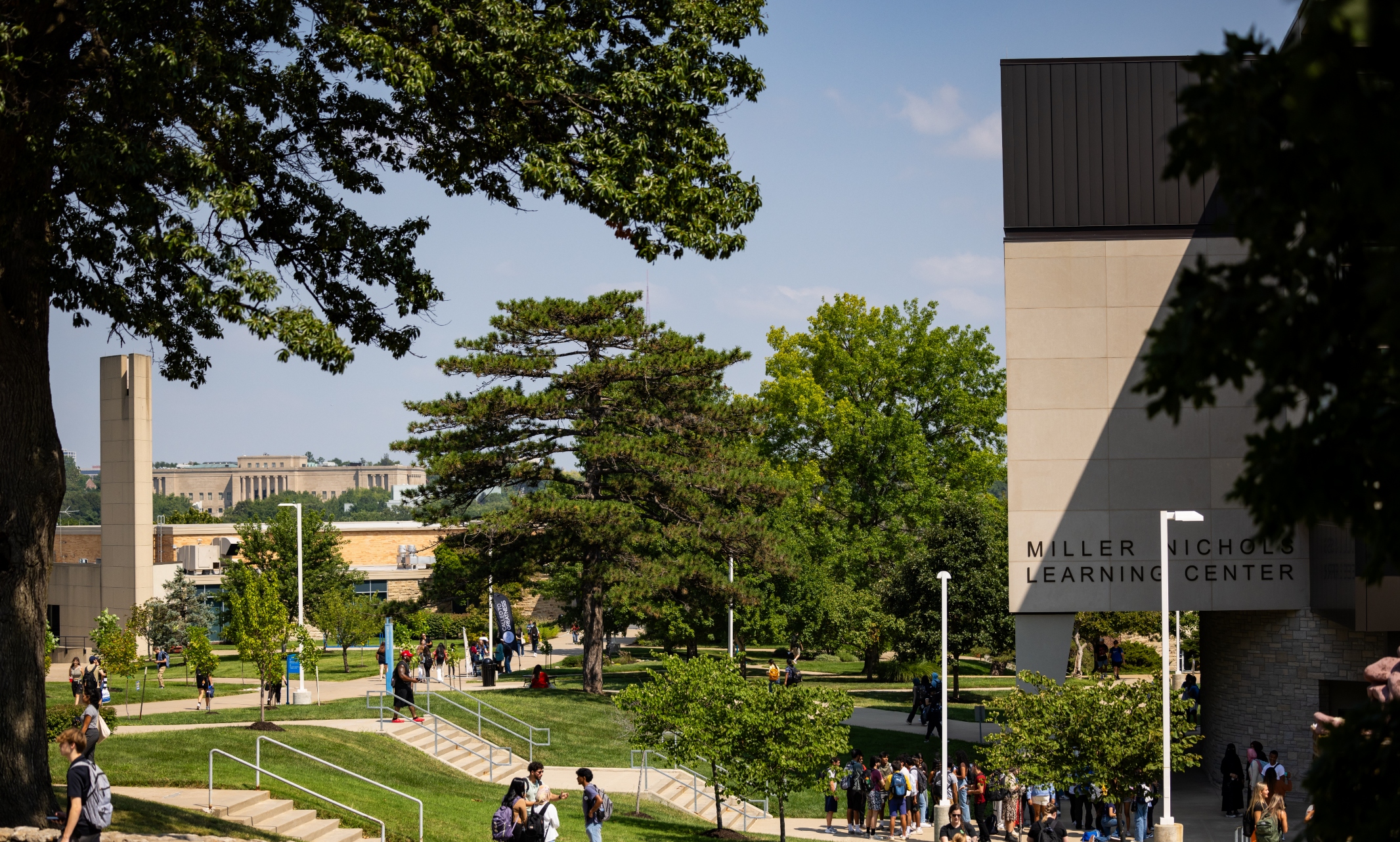
Kansas City’s university earns continued recognition for its degree programs and student success
The University of Missouri-Kansas City jumped 25 spots in new overall U.S. News and World Report 2025 Best National Universities rankings released today.
UMKC leaders attribute the rankings improvement to a combination of efforts in recent years to accelerate student success. UMKC increased its performance in both six-year graduation rates and retention rates. In addition, the university achieved an increase in graduation rates for Pell-eligible students. “Student success is at the core of everything we do, so we’re proud that is the driving factor reflected in these rankings,” Chancellor Mauli Agrawal said. “It is a testament to our dedication to putting students first.”Among all public universities in the nation, UMKC ranked 244 of 434 public and private universities. UMKC ranked No. 135 in a comparison of the nation’s 225 public universities.In addition to the overall rankings, two UMKC undergraduate programs – nursing and engineering – ranked as top programs of their kind in Missouri. The UMKC Bachelor of Science in Nursing program tied with the University of Missouri in Columbia at 96th nationally. UMKC graduate nursing programs have consistently achieved top national rankings, as well. Earlier this year, the UMKC Doctor of Nursing Practice program ranked 19th in the nation, and 36th for online graduate nursing programs. It has ranked in the Top 50 in that category for 12 consecutive years.Dean Joy Roberts of the UMKC School of Nursing and Health Studies said the new 2025 rankings show the impact UMKC programs have. “Our commitment to excellence not only helps our students succeed, but also helps ensure that our region has access to high-quality care,” Roberts said. “This recognition solidifies that continuous work.”UMKC had the top-ranked undergraduate engineering programs in the state of Missouri, based on U.S. News and World Report criteria.Nationally, the engineering programs came 78th out of 286 universities. The UMKC School of Science and Engineering offers four engineering programs: biomedical, civil, mechanical, and electrical and computer.
Dean Kevin Truman said the recognition solidifies UMKC as a leader in engineering education.“We are thrilled to offer students a nationally recognized program right here in Kansas City, and we plan to build an even stronger set of programs for the future,” Truman said. “Between the Robert W. Plaster Center that opened in 2021 and new space for biomedical engineering opening in 2026 in the Healthcare Delivery and Innovation Building, our students have unmatched access to faculty, equipment and technology to help them learn and innovate.”UMKC has a number of nationally acclaimed academic programs. Earlier this year, the UMKC School of Medicine ranked 20th in the nation in “Serving Health Professional Shortage Areas” and 75th in “Most Diverse Medical Schools” in the U.S. News and World Report 2024 Best Graduate Schools for Medicine. Also this year, the UMKC School of Pharmacy Doctor of Pharmacy program ranked 31st in the country and the UMKC School of Law ranked in the nation's Top 50 in two sub-specialty categories: legal writing (16) and trial advocacy (48).
Sep 24, 2024
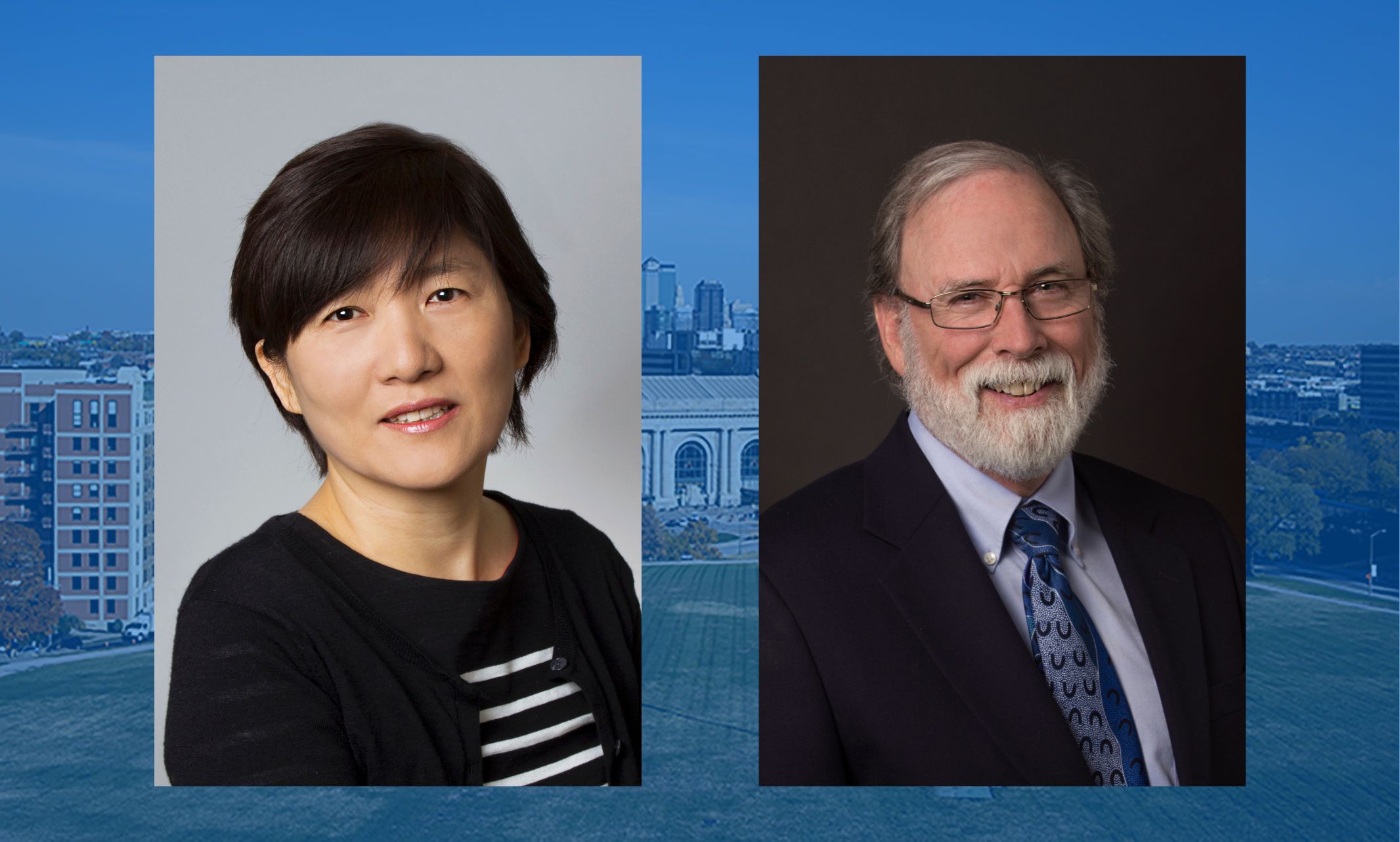
Yugyung Lee and Sean O’Brien receive most prestigious rank in UM System
The University of Missouri Board of Curators recently named two University of Missouri-Kansas City faculty members Curators' Distinguished Teaching Professors.
This designation is the highest and most prestigious academic rank awarded by the Board of Curators, given to a select few outstanding scholars with established reputations for research or teaching.
This year’s honorees from UMKC are Yugyung Lee, Ph.D. of the School of Science and Engineering and Sean O’Brien (J.D. ‘80) of the School of Law.
“Both Lee and O’Brien are exemplary models of what it means to be a UMKC faculty leader,” said UMKC Provost and Executive Vice Chancellor Jennifer Lundgren. “It is rewarding to celebrate the achievements of talented colleagues who are passionate about their work.”
Lee’s teaching focuses on artificial intelligence, data science, deep learning and other emerging technologies. Some of her work focuses on real-time and big data analytics for pervasive systems, a network of continuously connected embedded devices to enhance quality of life. She recently worked on research to improve accurate detection of oral cancer by addressing the scarcity of deep learning-based image segmentation research specifically targeting oral cancer and the lack of annotated data.
"I am deeply honored to receive the Curators’ Distinguished Teaching Professors Award. This recognition highlights the inseparable connection between teaching and research.” Lee said. “Working with students has always inspired my research, just as my research has enriched the next generation of scientists and educators. A true researcher is, at heart, a true educator, and I am grateful for the opportunity to continue learning and growing alongside my students."
O’Brien joined the law school faculty in 2005, teaching criminal law, criminal procedures, sentencing mitigation and post-conviction remedies. He has made a career of freeing the wrongly convicted, including people who have been in prison for decades. He successfully argued in front of the Supreme Court Schlup vs. Delo, a landmark case that expanded the ability to reopen a case in light of evidence of innocence. O’Brien is a member of the Board of Directors of Miracle of Innocence, a nonprofit organization that advocates for innocent prisoners and helps restore them to the community. Since 1983, O’Brien has supervised clinics at UMKC Law that provide pro bono legal assistance to innocent and condemned prisoners with the help of UMKC Law interns.
A UMKC School of Law alumnus himself, he was recognized as the 2023 Alumnus of Year by the UMKC Alumni Association.
“I have such wonderful faculty colleagues campuswide,” O’Brien said. “I am deeply honored by this recognition just for doing what I love to do.”
In addition to Lee and O’Brien, this year’s recipients also include:
Cody Ding, University of Missouri-St. Louis
David Kimball, University of Missouri-St. Louis
Xuemin (Sam) Wang, University of Missouri-St. Louis
Merilee Krueger, Missouri University of Science and Technology
Ming C. Leu, Missouri University of Science and Technology
Sep 24, 2024
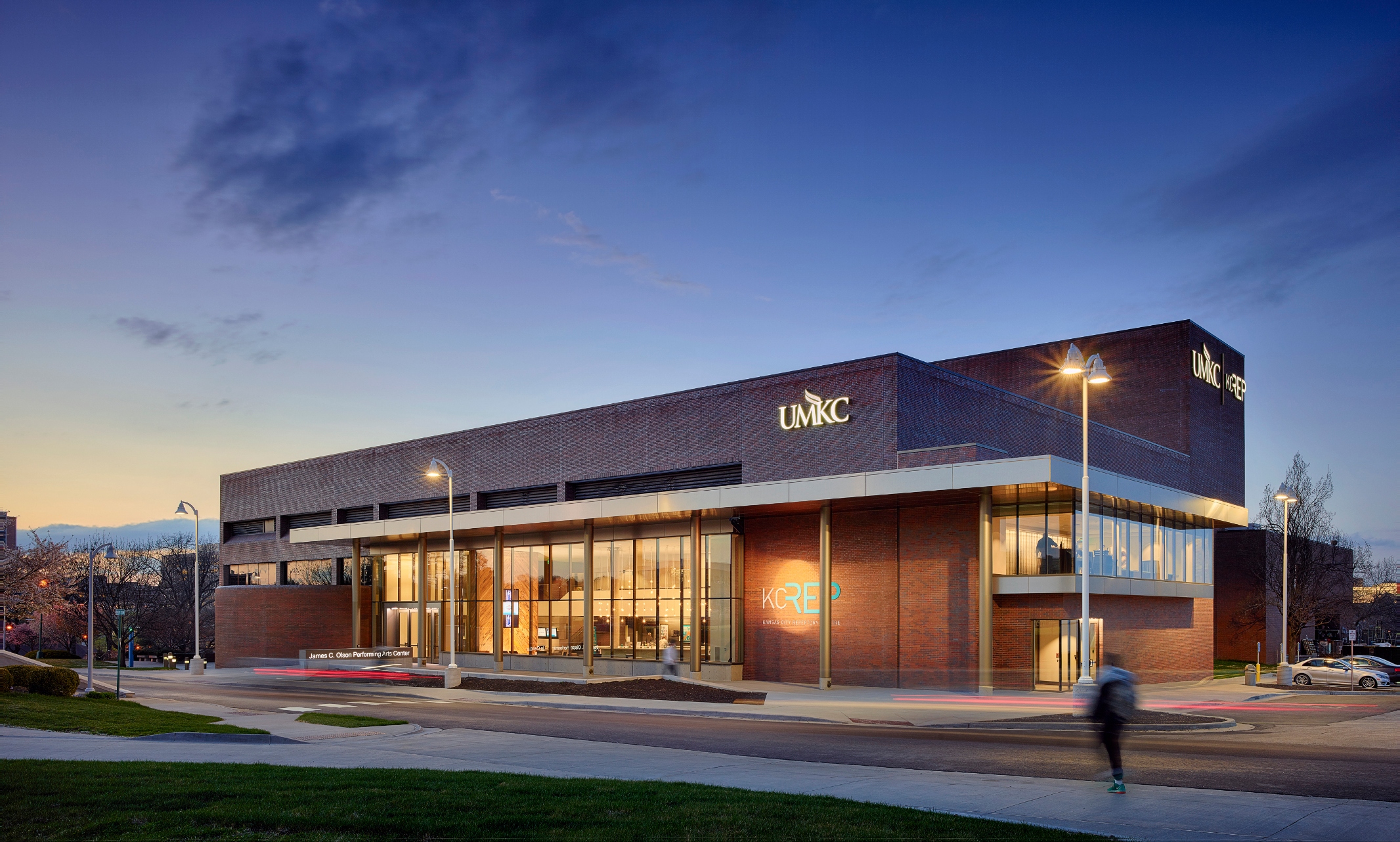
Current educational affiliation agreement to expire June 30, 2029
After a groundbreaking and fruitful partnership of more than 60 years, Kansas City Repertory Theatre (KCRep) and the University of Missouri-Kansas City (UMKC) announce today that their current educational affiliation agreement will be allowed to sunset upon its conclusion in 2029.
The affiliation agreement was created to identify benefits for both institutions including providing professional opportunities for UMKC students both on stage and behind the scenes throughout the KCRep season and create ongoing academic opportunities in the theatre arts for both faculty and students with KCRep artistic leadership. The agreement includes the sharing of some resources and facilities, most notably Spencer Theatre in the James C. Olson Performing Arts Center on the UMKC Volker Campus. The growth of both organizations has led to space and scheduling constraints. The UMKC Conservatory will soon begin a renovation project in the building and KCRep is currently charting a plan for their future.
KCRep and UMKC Conservatory have always been and will continue to be valued partners to each other. Both organizations will continue fruitful collaborations in staging productions and creating opportunities inside and outside the classroom for students, as they continue to benefit from exposure to theatre professionals who work with and for KCRep. Notably, KCRep plans to continue its beloved Kansas City tradition of staging its annual production of A Christmas Carol in the Spencer Theatre at UMKC past 2029.
The history of both Kansas City institutions has been linked together thanks to the longtime chair of the UMKC theatre department, Patricia McIlrath, Ph.D. (1917-1999), known as Dr. Mac. In 1964, she founded the Missouri Repertory Theatre (later renamed KCRep). Many in Kansas City credit her influence and mentorship for establishing local theaters including the Coterie, Unicorn Theatre and New Theatre and Restaurant. McIlrath believed in the importance of practical training for theatre students in an academic setting, and for decades, the repertory theatre was a key component of UMKC students’ curriculum. Over time, this partnership helped establish KCRep as a source for outstanding regional theatre. This success for both institutions now allows this transition toward more individual paths.
“We wouldn’t be the organization we are today without our visionary founder Dr. Patricia McIlrath and UMKC,” Kansas City Repertory Theatre Artistic Director Stuart Carden said. “We are truly grateful for our rich partnership, which has made so much possible for our organization. KCRep is now poised to grow and expand in new and exciting ways in the coming years throughout our community. And I know UMKC has bold strategic plans as well. This next step is a natural evolution for us both. In additon to A Christmas Carol, we will continue to partner with UMKC as opportunities arise. This revised agreement gives us the freedom to envision and plan our future. I cannot wait to share what’s to come!”
”This is a story of success for UMKC and KCRep,” said UMKC Conservatory Dean Courtney Crappell. “Both of these institutions have grown and flourished to such an extent that they are able to embark on new ventures and opportunities. Our shared history goes back to longtime UMKC Theatre chair and KCRep founder Patricia McIlrath, Ph.D., and her pioneering spirit. The UMKC Conservatory and KCRep honor this history by continuing on our mission of education, innovation and access to the arts. We look forward to the future renovation and expansion of Olson Performing Arts Center and a new phase of our relationship with KCRep.”
About Kansas City Repertory Theatre
Celebrating 60 years of transformative theater, Kansas City Repertory Theatre is a cultural catalyst at the center of our nation's creative crossroads. Upholding their mission to inspire, entertain, and open minds by creating transformative theatre experiences for all KCRep produces world-renowned classic works and world premieres on their two mainstages, in unique spaces, and throughout the community. Lauded by The Wall Street Journal, TIME, Variety and The Toronto Sun, KCRep regularly produces at Spencer Theatre, where it serves as the professional theatre in residence at the University of Missouri-Kansas City, and Copaken Stage located in downtown Kansas City. Under Artistic Director Stuart Carden KCRep employs more than 150 professional artists, technicians, and administrators, and historically serves more than 60,000 patrons and 10,000 school children annually. To receive updates and news, like KCRep on Facebook, follow on Twitter (@KCRep) or Instagram (@KCRepTheatre) and YouTube.
About the University of Missouri-Kansas City
The University of Missouri-Kansas City, one of four University of Missouri campuses, is a public research university serving more than 15,500 undergraduate, graduate and professional students. UMKC engages with the community and world based on its mission: placing student success at the center; leading in life and health sciences; advancing regional engagement; excelling in visual and performing arts; and promoting research and economic development. For more information about UMKC, visit umkc.edu. You can also find us on Facebook, follow us on X, see us on Instagram, engage with us on LinkedIn and watch us on YouTube.
About the UMKC Conservatory
The internationally-renowned UMKC Conservatory was founded more than a century ago, and trains professionals in music, dance and theatre. The Conservatory’s mission is to advance creativity, performance, scholarship and learning in the arts. They are a vital partner in Kansas City’s cultural environment and collaborate deeply with community institutions through performances, workshops and more. Faculty and alumni of the Conservatory have won numerous honors and awards, including Grammys, Pulitzer Prizes and Fulbright and Guggenheim fellowships. The Hollywood Reporter has recognized the UMKC costume design program among the Top 10 in the U.S. for six years in a row. For more information about the UMKC Conservatory, visit conservatory.umkc.edu. You can also find it on Facebook and Instagram.
Sep 23, 2024
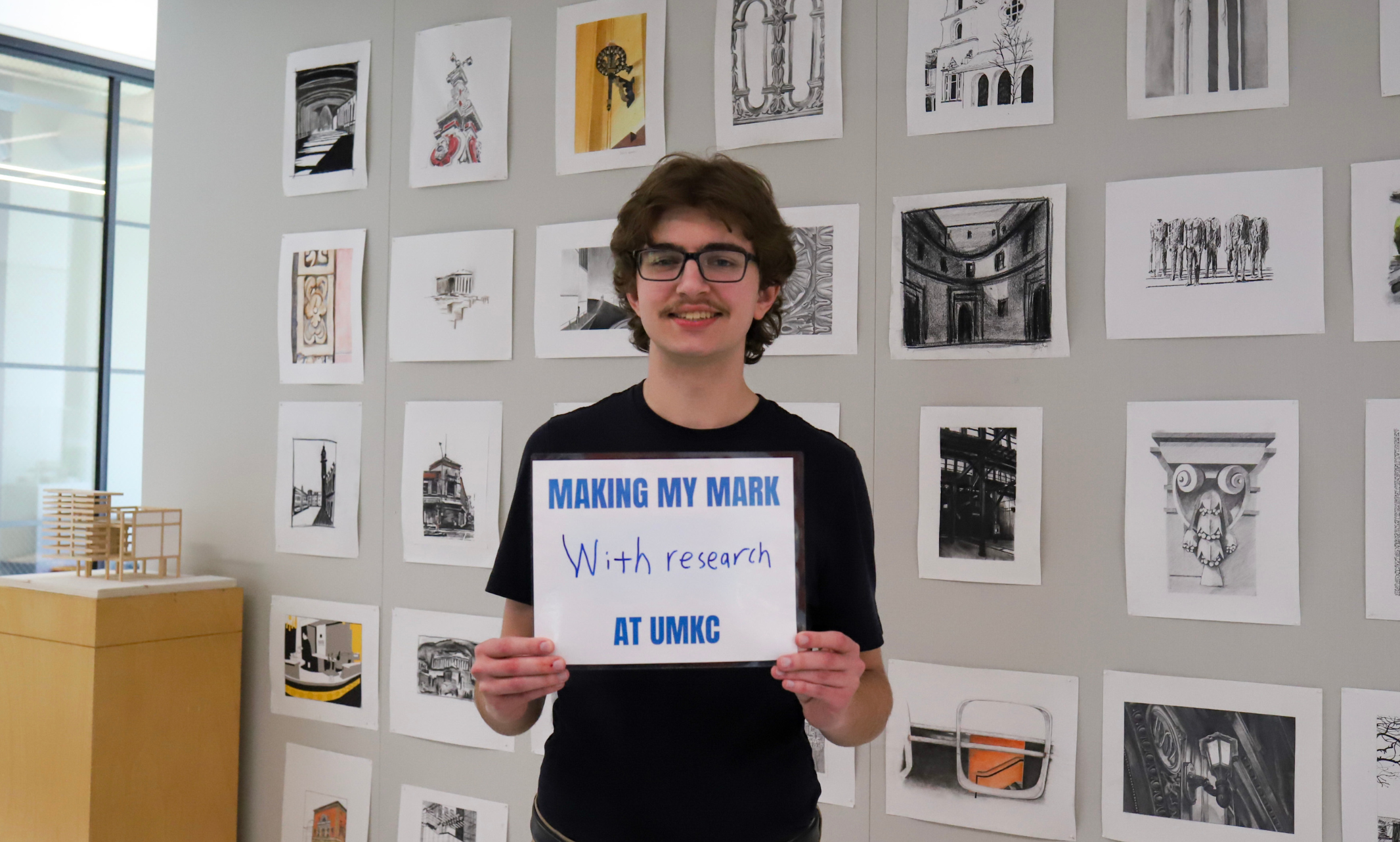
Robust faculty and staff allows student to make professional connections
At UMKC, students write their own stories, form their own definitions of success and chart innovative career paths. Aaron Beckman, from Omaha, Nebraska, came to UMKC to build his future as an Urban Planning + Design student and has made connections and taken part in research projects in the process.
Aaron Beckman
Anticipated graduation: 2025
UMKC degree program: Urban Planning + Design
Hometown: Omaha, Nebraska
Why did you choose UMKC?
UMKC offers an accredited urban planning program, which was an important factor to me when it came to deciding where to attend college. Plus, no other colleges offered the program at an affordable cost with outstanding faculty and staff close to home. I knew attending a college in the heart of Kansas City would significantly enhance my college experience.
Why did you choose Urban Planning + Design?
The urban planning + design field combines a lot of my interest, such as history, politics and geography. I also like that you get to make an impact by helping people solve issues through policy.
What are the benefits of the program?
The faculty and staff are definitely a huge benefit of the program. The faculty is diverse, and everyone has their own niche area of expertise. For example, Professor Julia Crowley focuses on environmental planning while Professor Jacob Wagner is more focused on history, people and community. Each professor having a different area of expertise makes the urban planning and design program well-rounded.
How has your program inspired you?
I’d say it has inspired me to go out and talk to people more. Just being out on the field and learning about the impact you can have on community; it has showed me the importance of interacting with people to find out more about their concerns.
What do you hope to take from your experience from UMKC into your professional career?
There are a lot of amazing connections here, specifically with the resources that the faculty provide you.
One of my recent research opportunities came through one of my professors. I was working closely with Professor Sungyop Kim when he asked me to help him with a project he was working on for the Missouri Department of Transportation (MoDOT).
We examined bridge conditions, specifically in rural Missouri as a lot of the infrastructure there had not been updated or maintained properly. We did background research on how other state departments of transportation were managing their assets and did field work an hour north of Kansas City by scanning bridges using Lidar, which is a software that creates a 3D model of the bridge. A program was then created by the computer science department to serve as a tool to access the quality of the bridges by simply scanning them, saving MoDOT time, money and resources.
What is one word that describes you?
Focused. I’m a very detail-oriented person and like to make sure every little thing is accounted for.
What is your favorite spot in Kansas City?
I really like the Nelson-Atkins lawn. It’s especially nice when the weather is warm because you can just lay out a blanket and have a picnic.
Do you see yourself staying in Kansas City after graduation?
Yes, that is the goal. I have family here. The job opportunities are also really good, especially with how connected the urban planning community is.
Sep 19, 2024
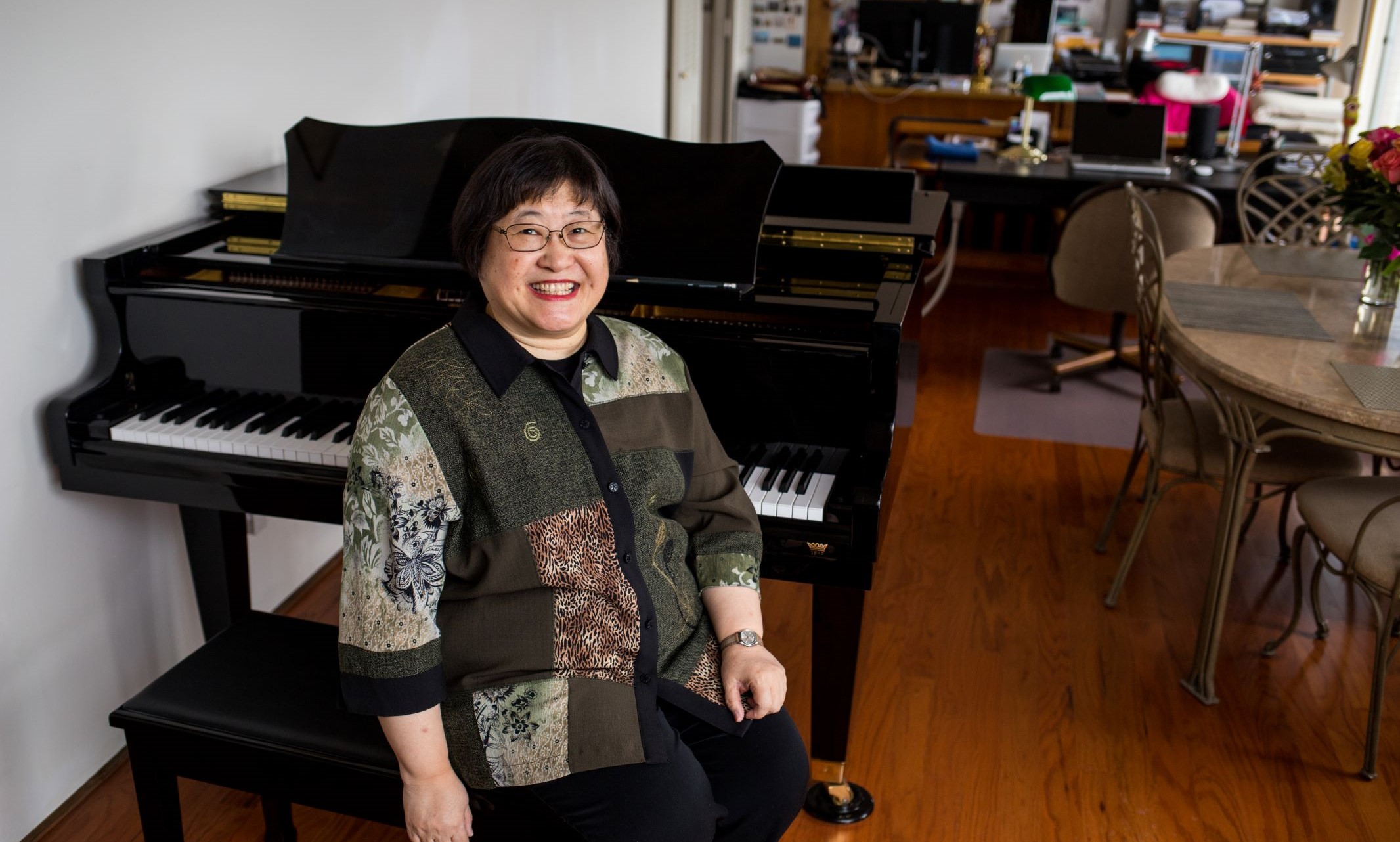
Chen Yi’s newest world recognition follows a career of breaking glass ceilings; overcoming obstacles
Chen Yi, DMA, Lorena Searcy Cravens/Millsap/Missouri Distinguished Professor of Composition at the University of Missouri-Kansas City, is one of the newest honorary members of the International Society for Contemporary Music. Chen joins the ranks of legendary musicians such as Igor Stravinsky (“Rite of Spring,” “The Firebird”) and Aaron Copland (“Appalachian Spring,” “Fanfare for the Common Man”).
“It’s a privilege and an honor to have my work supported by my peers worldwide,” Chen said. “I have studied many of their compositions extensively because they’re the great composers of our time, and I’ve worked with some of them in competitions and festivals. It’s humbling to be recognized along with them.”
Musicians are nominated and voted on before becoming an honorary member. The title honors a person’s internationally remarkable achievements in the field of contemporary music.
“Dr. Chen’s accomplishments are incredible and can be held up next to any composer of our time,” UMKC Chancellor Mauli Agrawal said. “We’re fortunate to have her here at UMKC, and there’s no question that her students benefit greatly from her knowledge and creativity.”
Founded in 1922, the International Society for Contemporary Music, or ISCM, has inducted 74 musicians in its history; only four are women. Chen is one of two musicians to be inducted since 2020.
“As the only female, Asian composer to be an honorary member, I feel more responsibility to support female composers in our society,” Chen said. “I share my experiences with younger generations and work hard to inspire more people, to bring up more female composers and let their voices be heard in our society.”
Chen has achieved international renown as a prolific composer who blends Chinese and Western traditions, transcending cultural and musical boundaries. Born in China, Chen began playing the piano at age 3 and the violin when she was 4. The Cultural Revolution interrupted her studies as a teenager. After nearly two years of hard labor in the countryside, Chen returned to her home city of Guangzhou to play violin as the concertmaster in the orchestra for the Beijing Opera Troupe in Guangzhou.
Chen received bachelor’s and master’s degrees from the Central Conservatory in Beijing, and in doing so became the first woman to earn an M.A. in music composition from the institution. She earned a Doctor of Musical Arts from Columbia University in New York and has served as Composer in Residence in the Women’s Philharmonic, Chanticleer and Aptos Creative Arts Center. In 1996, Chen became the first woman in the United States to give a whole evening of multimedia concert with her symphonic and choral works in San Francisco.
She has received fellowships and awards from the Guggenheim Foundation (1996), Fromm Foundation at Harvard University (1994), Koussevitzky Music Foundation at the Library of Congress (1997) and National Endowment for the Arts (1994). Chen was a recipient of Ives Living Award from the American Academy of Arts and Letter in 2001-2004 and a Pulitzer Prize finalist for orchestra in 2006. She was inducted into the American Academy of Arts and Sciences in 2005 and the American Academy of Arts and Letters in 2019.
In addition to all her accomplishments, Chen is a strong advocate and cultural ambassador for musicians around the world. She has worked with musicians in programs in the United States, United Kingdom, Germany, Poland and many Asian countries. Her influence can be felt worldwide in the works of her students, including UMKC Doctor of Musical Arts student Ian Chung.
“Dr. Chen is one of the best teachers I have ever had, her guidance and insights have profoundly shaped my approach to composition,” Chung said. “Her way of explaining complex musical ideas with clarity and patience has transformed how I understand contemporary classical music. Moreover, she provides invaluable insights on the music industry and helped me shape my career path. I feel incredibly fortunate to have Dr. Chen as a mentor, and her influence will resonate in my work and career for years to come.”
Sep 18, 2024
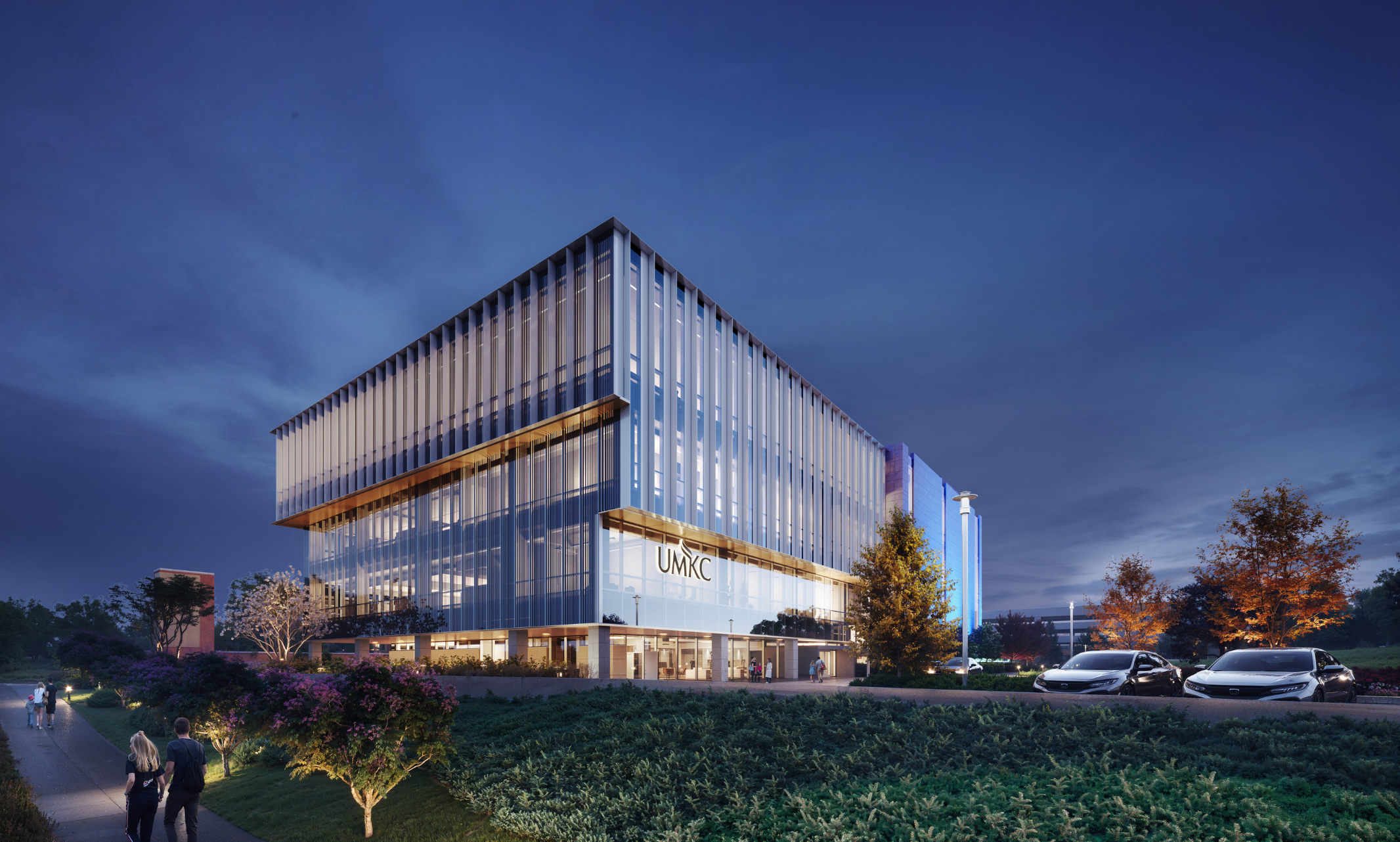
$145 million project is largest UMKC capital project in university history
Tents showcasing University of Missouri-Kansas City dental and medical students using the latest technologies greeted visitors at a celebration open to the neighbors and the community of the university’s largest capital investment to date: the $145 million Healthcare Delivery and Innovation Building.
UMKC Chancellor Mauli Agrawal led the program at the construction celebration of the Healthcare Delivery and Innovation Building. Photos by Brandon Parigo | UMKC
UMKC celebrated the start of construction on Wednesday with a party on the corner of 25th and Charlotte streets where this five-story, 160,000-square-foot signature building will soon rise from the ground. UMKC envisions that the new building will catalyze growth in the UMKC Health Sciences District, a collective entity that includes four UMKC health professions schools, University Health, Children’s Mercy and numerous other healthcare organizations in an 18-block area on Hospital Hill.
The new building will enable the university to provide state-of-the-art education for the next generation of dentists and doctors, find new and better ways to serve patients in need, strengthen collaborations with surrounding neighborhoods and facilitate greater interdisciplinary partnerships to fuel innovation and research.
U.S. Sen. Roy Blunt spoke at the event, saying the new building represents future innovations in healthcare.
Speakers at Wednesday’s event, including former U.S. Sen. Roy Blunt, University of Missouri System President Mun Choi, UM Curator Chair Robin Wenneker, students and UMKC Chancellor Mauli Agrawal spoke of the transformation the building will bring to healthcare education in Kansas City and the surrounding region.
“As exciting as this new facility is – as exciting as today is – I want to emphasize that this is just the beginning,” Agrawal said. “This building is the first piece of a much larger vision for our UMKC Health Sciences District.”
Funding for the project came from public and private sources, with the largest portion coming from state funding. Missouri Gov. Mike Parson led the charge to make the project happen, in partnership with state legislators. The Sunderland Foundation and the Hall Family Foundation also contributed generously, and Blunt secured a federal grant.
At Wednesday’s celebration, UMKC also celebrated one of its alumni - Nelson Sabates (B.A. ‘83/M.D. ‘86) his wife, Rachael, and their children who donated a gift of $3 million for the project - the largest alumni donation the School of Medicine has received. Their family name will grace the terrace and grand lobby of the building.
“This building represents the future of healthcare in Kansas City,” said Sabates, who also is a professor and chairman of the department of ophthalmology at UMKC. “My wife and I made this decision to help improve healthcare and health outcomes for our community. We hope others are inspired by this vision and will join us in creating an ever-growing and vibrant UMKC Health Sciences District."
UMKC School of Medicine professor and chairman of the department of ophthalmology Nelson Sabates, M.D., left, celebrates with Dean Alexander Norbash, M.D. The Nelson and Rachael Sabates Family donated $3 million for the new building.
Two students shared their views on the significance of the new building and the opportunities it affords them to receive an excellent education and give back to the community.
Jacey Brewer, a junior pursuing a biomedical engineering degree, said: “The proximity to Children’s Mercy is one of the reasons why I chose UMKC, and my dream is to work on designing prosthetics that will change children’s lives and give them their childhood back. This new building will provide the foundation for cutting-edge research and technological advancements in healthcare.”
UMKC biomedical engineering student Jacey Brewer spoke at the event.
Tim Nguyen, a third-year dental student and UMKC Trustees’ Scholar, said: “The Healthcare Delivery and Innovation Building will provide leading-edge pre-doctoral dental clinics, allowing students to serve more patients in need through advanced equipment, expanded hours for acute dental care and the ability to implement teledentistry for those where access to care is limited. With advanced clinical simulation labs and modern research spaces, UMKC will be able to continue to foster high standards in education and patient care in its future healthcare leaders.”
The Healthcare Delivery and Innovation Building, set to open in 2026, will house and support numerous programs, allowing for innovations in education and healthcare research and an emphasis on providing access to care for disinvested neighborhoods in Kansas City. McCownGordon will oversee construction of the facility.
Here are the key areas included in the building:
UMKC School of Dentistry
UMKC is a regional leader in dental education as the only public dental school in Missouri and Kansas. The new building will provide leading-edge pre-doctoral dental and dental hygiene clinics, enhancing the school’s ability to graduate top-notch dentists and hygienists. The new space also means students can serve more patients in need through advanced equipment, greater efficiency, expanded hours for acute dental care and the ability to implement teledentistry. Currently, the School of Dentistry provides up to $750,000 annually in uncompensated dental care for the community.
UMKC Provost Jenny Lundgren interacted with UMKC School of Dentistry students who showcased new technologies.
UMKC Health Equity Institute
The institute brings together researchers, government and community organizations to improve the lives of the underserved and bridge healthcare gaps. The institute combines its research strengths with community groups’ grassroots involvement to identify, quantify and reduce those gaps. In the new building, researchers will collaborate to tackle health disparities and provide access to healthcare with initiatives including Our Healthy Jackson County, bringing free vaccines, health screenings and other resources into neighborhoods and places of worship.
UMKC School of Medicine Professor Jannette Berkley-Patton, director of the UMKC Health Equity Institute, left, stands next to the Rev. Eric Williams and Carole Bowe Thompson. Williams, who partners in community health research efforts, spoke at the event.
Data Science and Analytics Innovation Center
In partnership with the University of Missouri and other UM System universities, UMKC leads a center focused on creating new advances in data sciences and analytics. The new space in the building will provide the center opportunities to focus the power of data science on transforming the way we personalize healthcare. The data center within the new facility will provide high-performance computing for industry, government and nonprofit organizations within our region to solve data-intensive computing problems.
University of Missouri Curator Robert Fry is an alumnus of the UMKC School of Dentistry and did the Roo hand signal.
UMKC biomedical engineering
In the new building, doctors, dentists, engineers and students will work side by side, creating faster, more-effective collaboration between science, engineering and the medical world. Product development will accelerate in areas such as medical implants, imaging technology and surgery tools, and UMKC can expand access to the in-demand biomedical engineering degree program from the School of Science and Engineering with potential global impact.
The UMKC Conservatory Mob band played at the event.
Sep 11, 2024
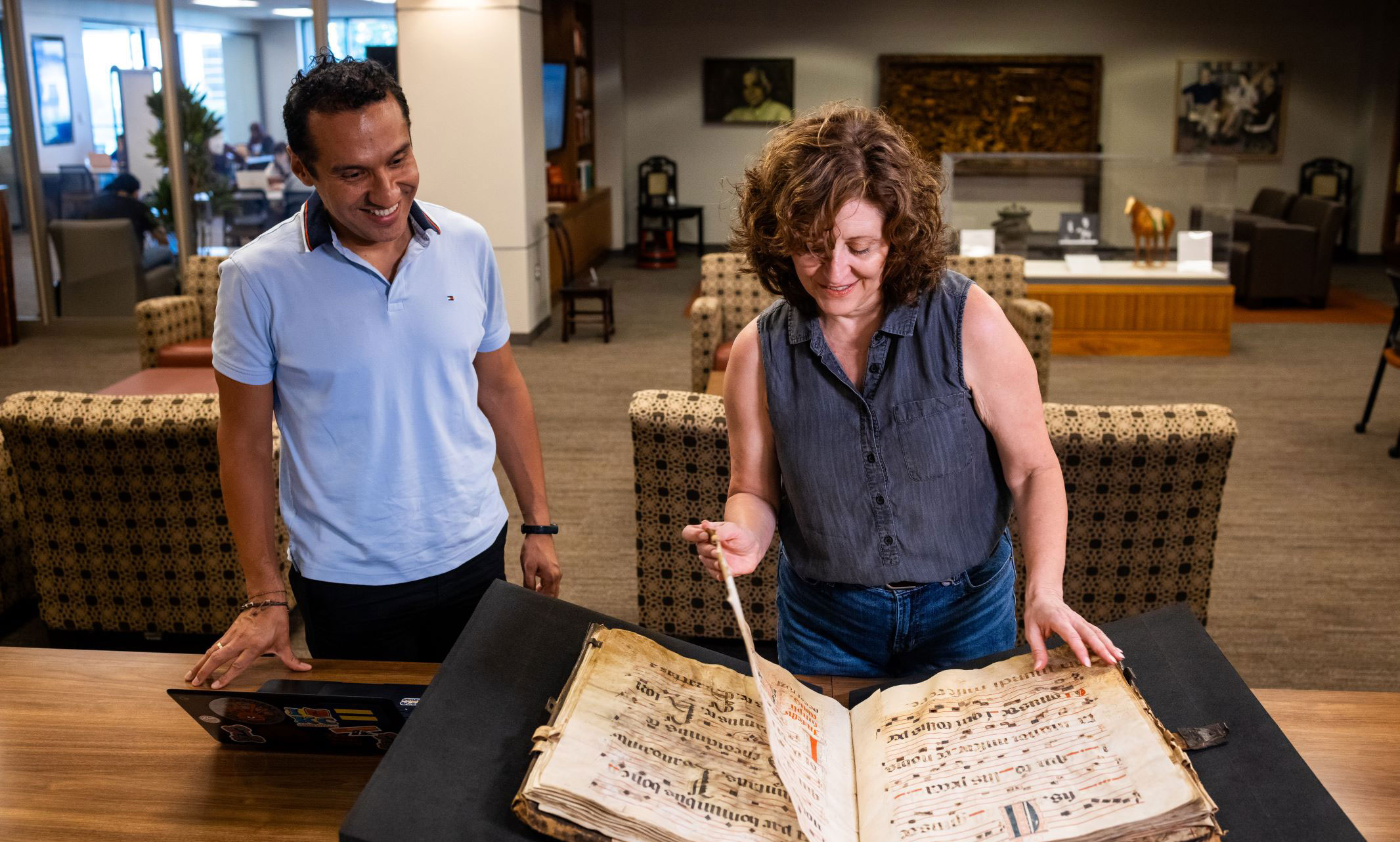
World-renowned UMKC researcher is making ancient texts available for next generation
In the quiet of the Miller Nichols Library, a faculty member and a student are poring over a book.
While the sight may be a familiar one on college campuses across the country, these two are poring over an original text, hundreds of years old, and they are working to make this text available to an international audience and future generations to come.
Virginia Blanton, Ph.D., Fulbright scholar and Curators’ Distinguished professor of English, and Milton Gómez-Toledo, Ph.D. candidate in English, are both a part of the Digital Analysis of Chant Transmission (DACT), a large network aimed to develop new digital resources in tandem with existing chant databases.
“When I think about how history, and particularly book history, gives us an opportunity to learn about other people, it also gives us a chance to learn about ourselves in terms of being part of the story of the human condition,” Blanton said.
Gómez-Toledo finds value in furthering the field of Medieval history through research, but he finds a lot of personal value as well.
“I have been contacting librarians, archivists and curators all over the United States to help us locate those manuscripts and fragments,” Gómez-Toledo said. “Some of the manuscripts have been relocated to Europe, and some of them are in different university libraries or private institutions. These research opportunities help students like me develop communication, organizational and interpersonal skills that are extremely relevant in our future careers.”
Even beyond the student community, Blanton’s research is giving a voice to people, primarily nuns, who have historically been voiceless for centuries.
“Virginia Blanton is one of those researchers who is very committed to delving into archives and locating materials that during the time that things transpired, were not seen as important,” said Tamara Falicov, dean of the UMKC School of Humanities and Social Sciences. “She's excavating the past and looking at people who have been marginalized in society. She’s doing more to make the contributions of this group visible.”
Like her student, Blanton finds value in the research for UMKC and across humankind itself.
“The community is really supported by a research university in terms of what we're able to deliver,” Blanton said. “It’s our obligation as faculty to help make these resources available to the larger community. I think we as humans try to make meaning. We want to look at the world and say that there is a reason and a purpose for our existence, and books are a way for us to inscribe that meaning.”
Sep 09, 2024
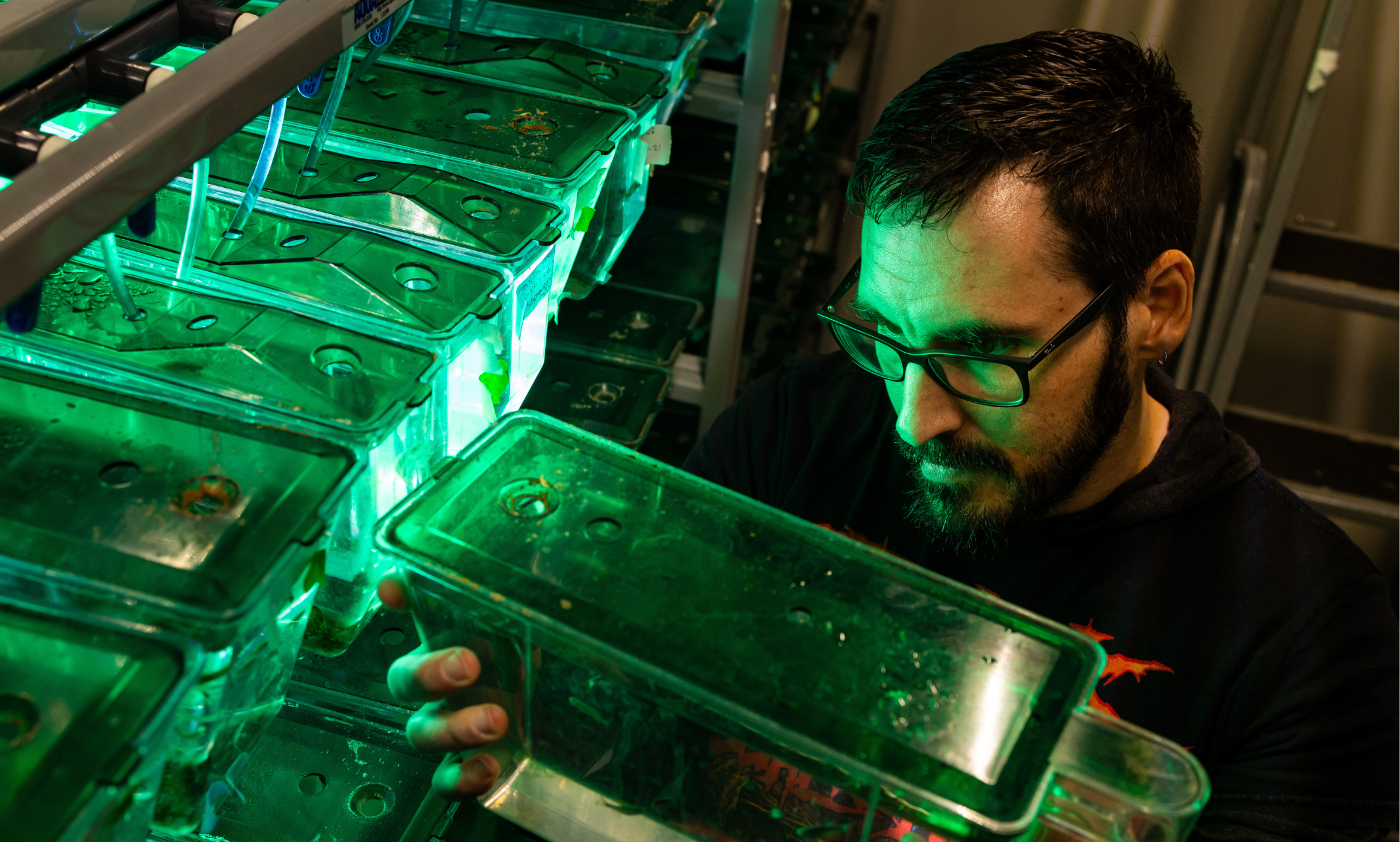
5 reasons why achieving Carnegie R1 status matters
The University of Missouri-Kansas City has set an ambitious goal for itself: achieving the prestigious Carnegie Research 1 designation.
As a Research 2, or R2, institution, UMKC already has achieved recognition for its “high” research activity. However, recent dramatic growth in its research enterprise has put UMKC within reach of the coveted R1 designation. From 2018-2023, UMKC more than doubled its total research expenditures and almost quadrupled its total research and sponsored grants.
With research growth continuing to rise, UMKC leaders anticipate that they might be named an R1 institution as soon as Spring 2025, based on Carnegie criteria. That would put UMKC in very elite company. In the past, only 146 of approximately 2,800 four-year institutions in the United States have held R1 status.
“Achieving the R1 designation would reflect our constant pursuit of excellence,” said UMKC Chancellor Mauli Agrawal. “But just as important, it would mark a key milestone in our journey as a world-class research institution and bring a host of benefits not only to the university but the entire greater Kansas City community.”
Why does achieving R1 status matter? Here are some of the key benefits for the campus and community:
1. Attracting additional world-class faculty and students
Achieving R1 status will make UMKC even more attractive to top-tier faculty and students from around the world. The prestige associated with R1 universities has traditionally served as a magnet for people seeking to work and study at the cutting edge of their fields.
2. Accelerating knowledge creation, innovation and entrepreneurship
An R1 designation indicates that an institution is investing in people and infrastructure to accelerate the creation of new knowledge to better serve society.
3. Enhancing the educational experience for students
Faculty engaged in research generate new knowledge that can enrich and advance the education students receive in the classroom and in applied experiences outside the classroom.
“Attaining R1 status will allow us to unlock new opportunities for our students,” said UMKC Provost and Executive Vice Chancellor Jennifer Lundgren. “For example, to help increase opportunities for students and support our goals for research growth, we’re launching eight new PhD programs. Those new programs will help us attract talented graduate students to work with faculty researchers in key programs, a win-win for both students and faculty.”
4. Increasing engagement with community partners and industry
An R1 ranking for UMKC would be the first for a Kansas City university and would elevate an already strong record of research partnerships to meet critical local and regional needs. UMKC’s status would enhance opportunities to attract increased funding and, ultimately, could lead to economic gains and job growth in the region.
“One of the things that’s impressed me the most about UMKC is the growth in its research enterprise,” said Dennis Ridenour, president and CEO of BioNexus KC. “That growth is making it easier to attract really world-class research talent in the region, and it’s also having an impact on the community as a whole.”
5. Boosting national prestige
Becoming an R1 institution will put UMKC in the top tier of universities nationally. In addition, the new designation will create opportunities to partner with other R1 institutions across the nation, which can lead to more research funding opportunities and partnerships with other elite institutions.
“Our achievements in growing the research enterprise showcase the adaptability, dedication and collaborative spirit of our exceptional UMKC researchers,” said Vice Chancellor for Research Sumeet Dua. “Our research advances accelerate the creation of new knowledge, benefiting our community and enriching our students' classroom experiences.”
Kansas City community leaders are taking note of UMKC research.
“UMKC has elevated its research tremendously in recent years, and achieving R1 status will make Kansas City an even greater place to work and live,” said Charlie Shields, president and CEO of University Health and chair elect of the Greater Kansas City Chamber of Commerce. “Not only will an R1 status for UMKC mean more innovation, discoveries and solutions, it will result in new funding, businesses and jobs for our region.”
For more on UMKC achievements in research from FY22-23, check out the UMKC Research Annual Report.
Sep 05, 2024
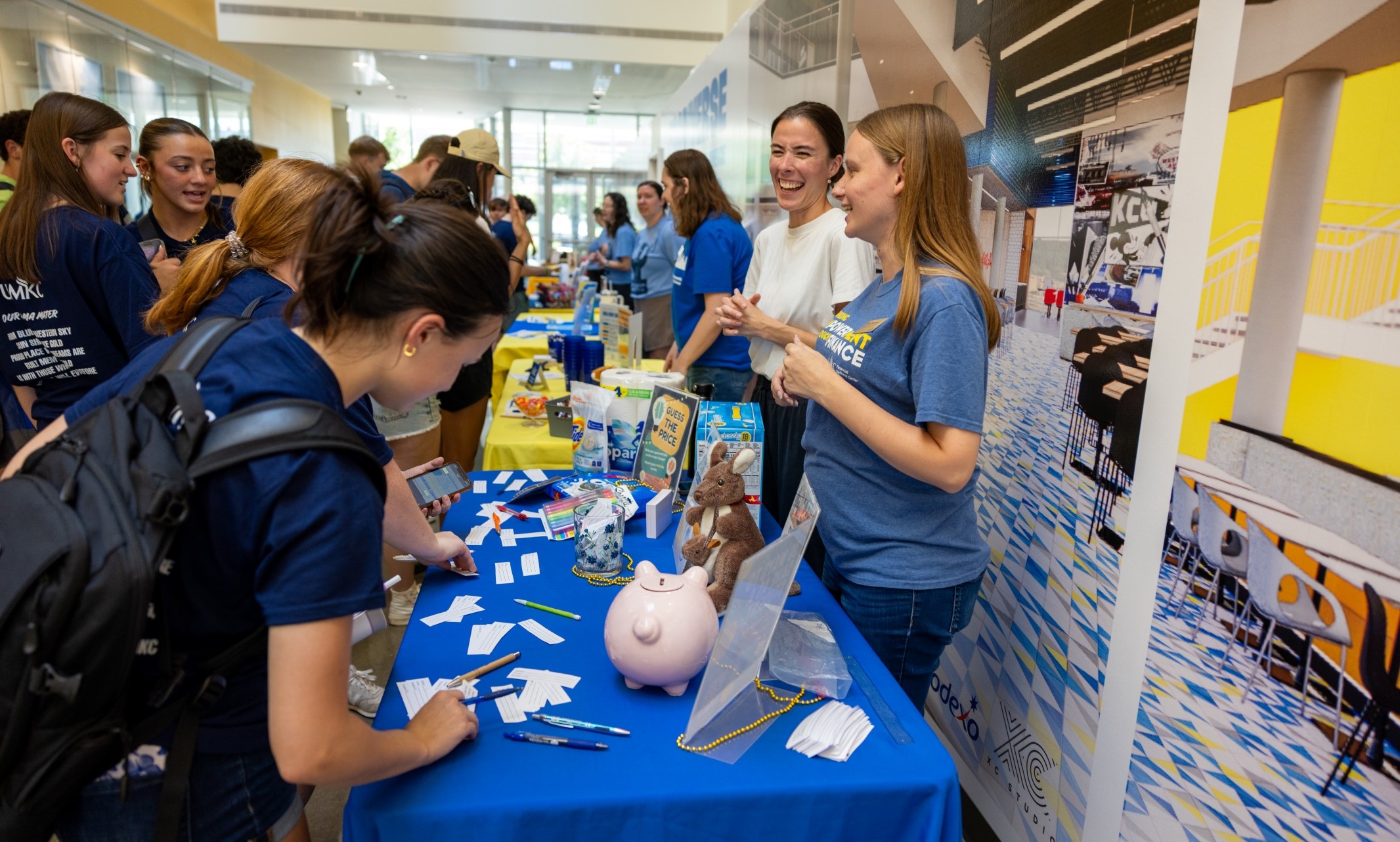
UMKC has numerous resources for students
College can be a challenging time, and UMKC has resources across campus to help ensure student success and wellness.
Academic Support and Mentoring
UMKC has a number of programs to help students reach their academic goals. Tutoring, Supplemental Instruction and writing assistance are just some of the programs available to students. Tutoring is available for nearly 100 courses; students can make appointments or join drop-in sessions. Supplemental Instruction, an internationally renowned program UMKC started, is an active approach to learning that supports students in historically difficult courses. SI uses small group sessions and collaborative activities to increase understanding. The Writing Studio offers consultations for students to develop their writing skills and assist with papers and presentations. Students can schedule a one-on-one consultation or join during drop-in hours.
Roo Wellness
Roo Wellness offers physical health, mental health and accessibility services and is housed in the Brookside 51 Building at the Volker Campus.
Physical health services include preventative care, illness and injury diagnosis and referral, immunizations, health screenings, women’s and men’s health services and more.
Mental health services include individual and group counseling, psychological assessment, medication referral and crisis intervention. Students can receive eight free individual counseling sessions per academic year and additional sessions with a small fee. Consultations and group counseling services are free.
Accessibility services assists in establishing accommodation plans for permanent and temporary needs. Accommodation plans can include parking and transportation, alternate text formats, service animals and more.
UMKC Police Department
The UMKC Police Department operates 24 hours a day, seven days a week. Along with crime prevention and response, campus police provide safety escorts, vehicle lockout assistance, jumpstart assistance and property registration.
The police department is involved with the operation of the university’s emergency alert system. The alert system includes an optional safety app students can download which, among other things, allows safety tip submission and text conversations with campus police.
Dr. Raj Bala Agrawal Care Center
The Care Center serves members of the UMKC community facing food insecurity. The Care Center includes a food pantry, meal donation program and information on community food assistance. Students can access the Kangaroo Pantry and select up to 20 items per week.
Student Affairs Case Management
The Division of Student Affairs provides support and crisis intervention to students facing obstacles that may impede their personal and academic achievement. Crisis intervention includes the sudden loss of basic needs such as housing, health insurance, finances and more. A case manager can advocate for students, help navigate community and campus resources and create an action plan.
Financial Wellness Center
The Financial Wellness Center provides education, workshops and individual coaching to help students reach their financial goals. Financial topics include planning to pay for college, creating budgets, understanding loan repayment, navigating credit, preparing for major purchases and more.
Career Services
Career Services has a variety of resources to help students with career development. It can help with resumes and cover letters, interview and networking preparation, graduate and professional school applications, career-path decisions and more. Programs allow students to borrow laptops on a semester basis and shop for business wardrobe items at no charge. Career fairs and other events provide networking opportunities to connect students to area employers.
Campus Recreation
Students have access to Swinney Center, the Aquatic Center, Durwood Stadium and Hospital Hill Annex. These recreation facilities include cardio and weight equipment, indoor and outdoor tracks, multipurpose studios, racquetball courts, a swimming pool, recreational field and more. Students can participate in group fitness classes and intramural sports at no extra cost.
UMKC Libraries
UMKC Libraries offer many academic resources and study spaces for students. In addition to millions of books, journals and other published academic works, the libraries have more than 330,000 sound recordings, audio-visual media, photographs, maps and more. Miller Nichols Library, the largest library on campus, houses LaBudde Special Collections and University Archives, Marr Sound Archives and Music/Media Library. Librarians are available 24/7 by online chat and can provide research assistance and help obtaining materials.
Shuttle Bus
The shuttle bus provides free transportation to students around the Volker and Hospital Hill campuses. The shuttle runs between campuses with stops at residential halls and prominent campus locations.
Student Life Organizations
UMKC is a vibrant community with people from a variety of backgrounds and life experiences. The university has programs and resources to connect students with similar interests and backgrounds. Some of these are Multicultural Student Affairs, International Student Affairs Office, Veteran Support Services, Women’s Center, LGBTQIA programs, First Gen Roo and Transfer Student Network.
Sep 03, 2024
